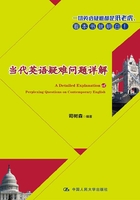
26“转移”动词arrive等的一般现在时可表将来的动作或状态
问:我在学习中见到这样两个句子:
(1)What time does the plane arrive in New York?
(2)The concert takes place next Friday.
答:我的问题是:这两个句子很明显该用将来时,为什么却用一般现在时呢?能解释一下吗?
我们知道一般现在时通常表示经常发生的习惯性的行为、动作或存在的状态。这是其基本用法,例如:
(3)The post comes two times every day.
(4)Why do you always get up so late?
但这个时态还可表示事先已经安排好或计划好的动作。这一用法通常限于某些表示移动的动词或称“转移”动词,如begin、come、arrive、fall、go、graduate、leave、meet、start和sail等。例如:
(5)The train starts at ten o’clock in the morning.
(6)Your flight leaves from Gate BA in 15 minutes.(你所乘的航班15分钟后就要从BA登机口起飞了。)
不仅如此,它还可表示将来的动作或状态。上述句(1)是表示预定的行为动作或者说表示事先安排好的动作,这种安排已经固定,不可随意改变,实际已成为一种事实。又如:
(6)My sister graduates from the university this coming July.
除了“转移”动词外,短语动词take place也常用一般现在时表示将来,类似用法的动词还有happen和occur等。例如:
(7)The election takes place in less than two weeks.
(8)Wherever he goes, I’ll go and I don’t care what happens.
(9)Important elections occur this fall.
在当代英语中,其实有些动词并非“转移”动词,但也可用一般现在时表示将来。例如:
(10)On Saturday morning we dine with the neighbours at Wilson’s club.(星期六上午我们要和邻居们在威尔逊俱乐部共进午餐。)
(11)The new prime minister makes his policy speech tomorrow afternoon.(新首相将于明天下午发表施政演说。)
(12)The young couple have their honeymoon next week.
此外,在抽象地谈论未来或未来的事物时,由于其时间概念不强,也可用一般现在时来表示。例如:
(13)The nurse of the future intends to be an equal partner to the doctor.
应该注意,用一般现在时表示将来还有下面几种常见的情况。首先,在表示将来的时间状语、条件状语从句中,谓语动词须用一般现在时或其他现在时态。例如:
(14)I will tell them after you leave(have left).
(15)We’ll go if the weather stays fine, but if it rains we’ll stay at home.
其他状语从句有时也可用一般现在时表示将来。例如:
(16)Next time I hope you’ll go where I tell you to without having to get out a subpoena for you.
(17)We’ll keep her inside so that they don’t bother her any more.
其次,有时为了强调事实或必然的结果或者某种安排,结果主句也可用一般现在时表示将来。例如:
(18)If we miss tonight’s train, we have to wait a whole week.
最后,主句如果表示将来,宾语从句则通常用一般现在时表示将来,从句多由疑问词引导。例如:
(19)China and the Netherlands will meet tomorrow to decide which team qualifies for the 1988 Summer Olympics.